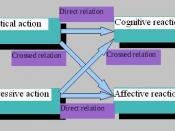Name : Fahmia Nur Azizah SN : 1102730 Class : Edu 6B Course : Functional Grammar
THE MOOD AND MODALITY SYSTEM IN FUNCTIONAL GRAMMAR
The Mood system is the system of grammar related to the interpersonal metafunction of language in which we use language to enact our personal and social relationships (Chiasuanchong, 2011). In other words, it looks at a clause in relation to how we use language to interact with others (Emilia, 2014), so that here we talk about the clause as exchange (Gerot and Wignell, 1994; Alvin, n.d.).
Based on this system, making an utterance is an interactive event inherently involving a speaker or writer and an addressee, in which the speaker selects a speech role for himself, and, simultaneously and thereby, allocates a speech role to the addressee (Gerot and Wignell, 1994). According to Halliday (2004), the most fundamental types of speech role are just two: 1) giving (inviting to receive) and 2) demanding (inviting to give).
At the same time as choosing either to give or demand in an exchange, we also choose the kind of commodity that we are exchanging (Emilia, 2014), which can be either 1) goods and services (objects and actions) or 2) information (language itself) (Halliday, 2004; Gerot and Wignell, 1994).
The combination of options of speech roles and commodities generates four speech functions: offer, statement, command, and question (Emilia, 2014; Gerot and Wignell, 1994). This can be shown by the following figure (adapted from Halliday, 1994 in Emilia, 2014):
Role in exchange | Commodity exchanged | |
Goods and services | Information | |
Giving | Offer: Would you like some ice cream? | Statement: He is giving her some ice cream |
Demanding | Command: Give me that ice cream! | Question: What is he giving her? |
In addition, there are also some kinds of responses to those speech functions that...


